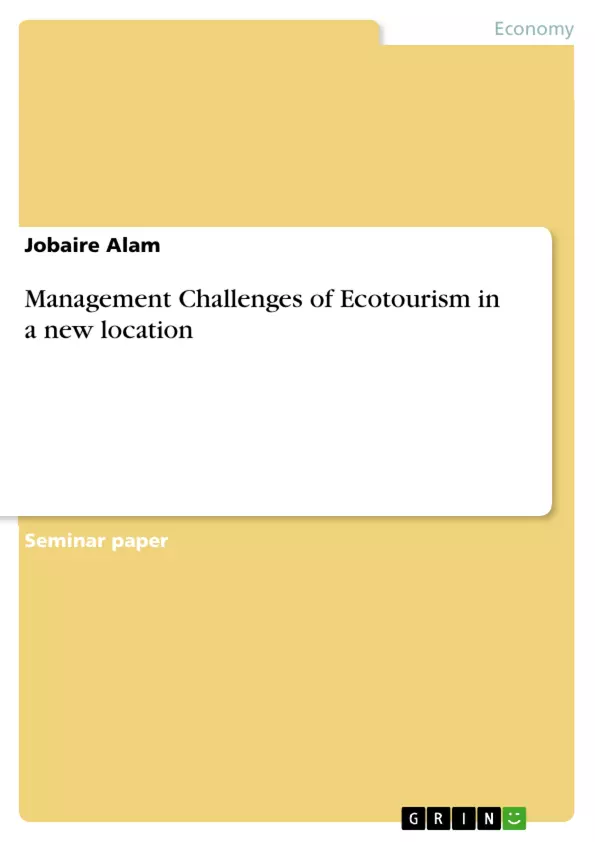Every country has its own concept of strategies to promote tourism. This is the time to re-arrange strategies which shift ecotourism experience to greater understanding, attitude change and more environment friendly behavior. Eco tourism is the fasted growing sector, with an estimated growth rate of 10-15% of one of the largest industries in the world Tourism.
This paper aims to identify the challenges, difficulties, threats for the managers and leaders of the tourism developing industry, when they try to develop a new ecotourism location in order to bring a massive improvement for the economy of a country. Moreover, this theoretical exploratory article will produce the best possible ways to overcome those challenges, threats and difficulties when the managers of tourism developing organization will step up to develop a new location for ecotourism.
Table of Contents
- Introduction
- Three Common Concepts of Ecotourism
- Contributors to the Topic
- Short Statement and Plan for Rest of the Thesis
Objectives and Key Themes
This thesis aims to identify the managerial challenges and threats involved in developing new ecotourism locations and to propose effective strategic management solutions to overcome these obstacles. The study explores the application of existing management theories to the unique context of ecotourism development, offering practical recommendations for tourism developers.
- Managerial challenges in establishing new ecotourism locations.
- Application of strategic management theories to ecotourism.
- Strategies for overcoming challenges in ecotourism development.
- Sustainable practices and their role in ecotourism.
- Economic benefits and community involvement in ecotourism.
Chapter Summaries
Introduction: This chapter introduces the concept of ecotourism, defining it as environmentally responsible travel to undisturbed natural areas that promotes conservation and benefits local communities. It highlights the growing importance of ecotourism as a sustainable industry, emphasizing its potential for economic development and environmental protection in developing countries. The chapter also contrasts ecotourism with mass tourism, emphasizing its low-impact approach and focus on cultural awareness. The chapter concludes by establishing the core research question: how can managerial challenges in establishing new ecotourism locations be effectively addressed?
Three Common Concepts of Ecotourism: This section explores the three core concepts underpinning ecotourism: nature-based, educational, and sustainable (social and economic). It discusses the various types of ecotourism, such as nature travel, special interest travel, and agrotourism, and analyzes the supply and demand factors influencing the success of ecotourism initiatives. The chapter also touches on the diverse range of tourism experiences encompassed by the term "ecotourism," illustrating the spectrum of activities and resources involved. The integration of ecological, social, and economic considerations is highlighted as crucial for successful ecotourism development.
Contributors to the Topic: This chapter outlines the theoretical framework for the thesis, drawing on existing research in environmental management and tourism studies. It identifies key scholarly contributions that inform the understanding of managerial challenges in ecotourism development, citing relevant journals and books that provide valuable insights into management strategies and their implementation in the tourism sector. This section lays the groundwork for applying theoretical models to the practical challenges of creating a new ecotourism destination, highlighting the importance of drawing on established management theories and practices.
Short Statement and Plan for Rest of the Thesis: This chapter summarizes the thesis's objective: to identify and address the challenges faced by managers in developing new ecotourism locations. It outlines the research methodology, which involves exploring relevant management theories and applying them to the specific challenges of ecotourism development. The chapter previews the thesis's anticipated outcomes, including practical recommendations for tourism developers and a contribution to the ongoing research in ecotourism sustainability. The authors also note their reliance on web searches to supplement existing literature on ecotourism due to a perceived gap in available resources.
Keywords
Ecotourism, sustainable tourism, strategic management, managerial challenges, tourism development, environmental conservation, community involvement, economic benefits, low-impact tourism, sustainable development.
Frequently Asked Questions: Ecotourism Thesis Preview
What is the main focus of this thesis?
This thesis examines the managerial challenges and threats involved in developing new ecotourism locations and proposes effective strategic management solutions. It explores the application of existing management theories to ecotourism and offers practical recommendations for tourism developers.
What are the key themes explored in this thesis?
Key themes include managerial challenges in establishing new ecotourism locations, application of strategic management theories to ecotourism, strategies for overcoming challenges in ecotourism development, sustainable practices in ecotourism, and the economic benefits and community involvement in ecotourism.
What are the main chapters included in the thesis?
The thesis includes an introduction defining ecotourism and establishing the research question; a chapter exploring three common concepts of ecotourism (nature-based, educational, and sustainable); a chapter outlining the theoretical framework and relevant scholarly contributions; and a concluding chapter summarizing the thesis objectives, methodology, and anticipated outcomes.
How does the thesis define ecotourism?
The thesis defines ecotourism as environmentally responsible travel to undisturbed natural areas that promotes conservation and benefits local communities. It emphasizes its low-impact approach and focus on cultural awareness, contrasting it with mass tourism.
What management theories are applied in this thesis?
The thesis draws on existing research in environmental management and tourism studies to identify and apply relevant management theories to the specific challenges of ecotourism development. Specific theories are not explicitly named, but the focus is on applying established models and practices.
What are the anticipated outcomes of this thesis?
The anticipated outcomes include practical recommendations for tourism developers and a contribution to the ongoing research in ecotourism sustainability.
What is the research methodology used?
The research methodology involves exploring relevant management theories and applying them to the specific challenges of ecotourism development. The authors also mention supplementing existing literature with web searches due to a perceived gap in resources.
What are the key words associated with this thesis?
Key words include Ecotourism, sustainable tourism, strategic management, managerial challenges, tourism development, environmental conservation, community involvement, economic benefits, low-impact tourism, and sustainable development.
- Arbeit zitieren
- Jobaire Alam (Autor:in), 2013, Management Challenges of Ecotourism in a new location, München, GRIN Verlag, https://www.grin.com/document/413355



